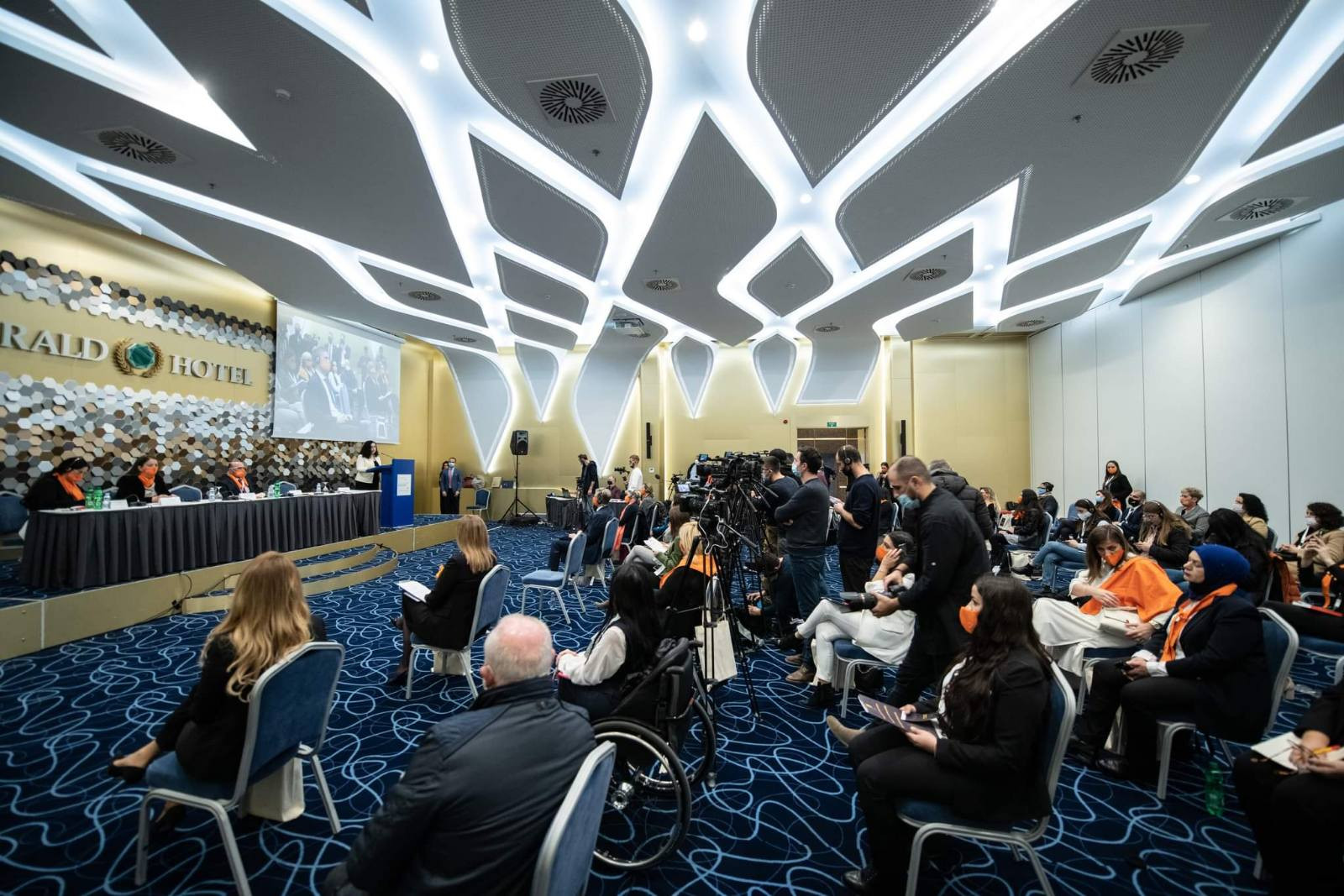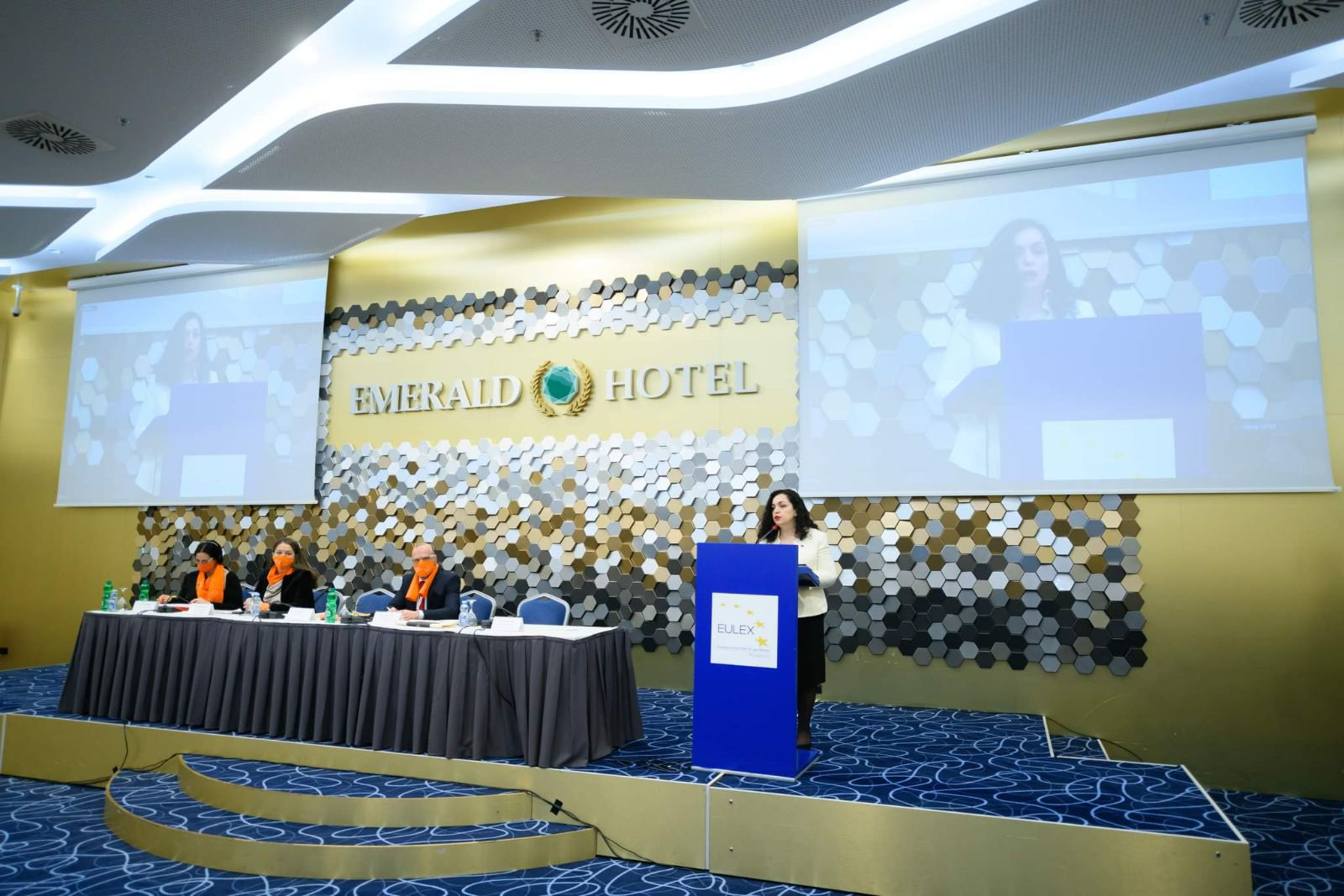Dear Mr. Wigemark,
Distinguished Ambassadors,
Highly esteemed participants from local institutions,
Ladies and gentlemen!
Thank you for the invitation today!
Discussing property rights within the 16 days of activism against gender-based violence conveys a clear message that economic empowerment and gender equality are basic preconditions for creating a society where women and girls feel both safe and empowered. Such discussions serve our common final goal. Respectively, these discussions further strengthen our efforts in combating violence against women and girls, clarifying once and for all that inheritance rights and property rights can no longer be tolerated to fall prey to gender discrimination. The inheritance issue is not just an isolated issue, but property really constitutes an instrument of economic empowerment and stability above all.
Women and girls, as we have heard many times, are undoubtedly a powerful pillar of our society. Their equal participation in every process alongside men contributes not only to the family benefit but also to our entire society and economy in general. This contribution includes in itself the inheritance, as well as the property right, which is undoubtedly protection and guarantee for well-being, independence and integrity and dignity. Property thus creates opportunities for economic independence and empowerment of the voice of women and girls against injustice and inequality.
As a result of the further presence of the patriarchal and discriminatory approach in relation to property rights, the current situation regarding property inheritance keeps being unsatisfactory. A very small percentage of property from parents is inherited by daughters, while a very small percentage is also evident in terms of women who own property.
Such a situation, unfortunately, does not differ much from the mentality that prevailed when the law was made by the Kanun and when the property right depended on gender, age and health status, while priority was then given to males. Thus “property and possessions” and as it was called “the rule of one's own house”, could be given in possession to a 15-year-old boy, but not a girl or woman.
Despite our advanced laws, the consequences of such a customary definition are manifested and present even nowadays in practice, circumventing the possibility offered under the legal framework. Therefore, the data on property ownership by women and girls in our country are at a very low level, which is also a concerning level.
It is so, despite the legal basis. Although the Kosovo Constitution clearly prohibits discrimination, the customary code is quite relevant in many parts of society.
Yet, we cannot deny the slow progress, which nevertheless is present. The data show an increase in the number of women who have initiated inheritance claims. At the same time, the number of women who were reported to have inherited property has doubled. It is precisely these positive developments that should be highlighted, applauded, but above all, they should be multiplied.
Women and girls should be committed to exercising their property rights, because property should not be seen as a gift. It is an acquired right. It should be clear that property is an opportunity to manifest integrity in facing the patriarchal elements.
And as society gradually internalizes the importance of what we are discussing today, we are the institutions that need to be much more determined to enforce legislation, amend and advance as appropriate, monitor compliance, as well as ensure fair and non-discriminatory inheritance sharing. Finally, the judicial system must address women's property rights claims fairly, efficiently and without delay. And this commitment must overcome any social divisions, ensuring that property rights are warranted and guaranteed for non-majority communities as well.
Dear participants,
Lack of an effective property rights system and lack of systematic coordination in combating domestic violence weakens the rule of law, has an adverse effect in respecting human rights, weakens the women’s position and consequently gender equality in society and hinders sustainable economic growth and collective well-being, because all of these are interrelated, and all have their starting point in equality. On the other hand, equality is impossible without economic empowerment, without respect for property rights.
Kosovo already has a package of laws, which regulate this area, but this should be followed by raising awareness in our society.
The economic prosperity of our country is built based on equal opportunities and chances, while equal property right is an important pillar to guarantee the success of our efforts in this direction. Ownership is much more than possession of a possession list. Property is an economic guarantee, it is collateral that facilitates access to financial instruments, and it is a confirmation of an empowered status in society. And occasionally, it is exactly what can make the difference between life and death, providing shelter for a girl or woman who is a victim of violence as well as opportunities for her to escape violence.
The number of women reporting cases of domestic violence has increased compared to previous years. The lockdown throughout the pandemic is seen as one of the main contributors in this regard. And often, the inability to have your own shelter as a woman, makes the situation much worse. Therefore, we are not just dealing with the property right, but above all, with an opportunity to say ‘Stop to the violence’ – But, nothing starts and does not end with the property. Nowadays more than ever, we need a comprehensive mobilization of our society and the Institutions of the Republic of Kosovo to combat gender-based violence. These 16 days of activism, but in fact 365 days of the year should be acted upon, in order to encourage women and girls to report cases of abuse and to promote their trust in the institutions that deal with them. It is therefore necessary to provide comprehensive and, above all, efficient mechanisms for a quick response to cases of domestic violence, as well as to raise public awareness of the non-acceptance and intolerance of domestic violence, whatever it may be.
Finally, as long as we work in this direction, it is high time we fight the so-called ‘shame’ and ‘honour’ mentality while embracing the value of life and protecting life above everything else. Violence is a shame, in addition to being a criminal offence. The lack of increase in the number of girls and women who are heirs and who own property is a shame, whereas let us see honour through the prism of honour that each of us will do to our society by empowering girls and women by guaranteeing the property right and eliminating violence against them.
Today, from this rostrum, I confirm to you that as President of the country jointly with other institutions, I will be committed in every single day of my work to have women protected against violence, this violence is eliminated, while their rights are respected. I also call on the justice institutions to prioritize cases of violence against women and make the perpetrators receive the punishment they deserve. Because, many cases of violence against women, and unfortunately also murders, could be prevented if the relevant institutions would have done the job properly and when it should.
Keeping silent against injustice and inequality should have never been an option because silence and impunity are both incentives for perpetrators of violent acts – and so they are tolerated to go on and often end up in killing women. Therefore, once again, we have to unite against gender-based violence and injustices during these 16 days of activism and 365 days of each year by concrete actions. We have to get mobilized to make women and girls feel safe in their homes, at work and everywhere else.
Thank you!



